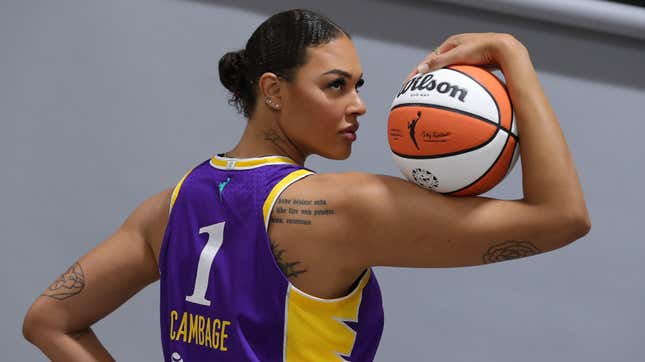Liz Cambage’s WNBA Downfall Was Full of Drama. It’s Not All Her Fault.
The player's story is one of alleged slurs, on-court tussles, Vegas binges, an OnlyFans account...and a league that wasn't equipped to help her.
In Depth

In April, star center and WNBA free agent Liz Cambage appeared at the Los Angeles Sparks’ media day ahead of the upcoming 2022 season—her first with the team. She glowed as she chummed it up with teammates and reporters, fueled by the hype and renewed hope for a Sparks championship that had accompanied her highly anticipated arrival. “Crowd’s gonna be lit, building’s gonna be lit…it’s gonna be the most wild summer. That’s how I think this season’s gonna go,” the Australian native told reporters that day. “And we’re gonna have a ring at the end of it.”
That summer did, indeed, turn out to be quite wild—though maybe not in the way Cambage had envisioned. Last week, the WNBA’s self-proclaimed “black sheep” suddenly exited the Sparks amid rumors that she had “quit.” Cambage had played just 25 games with the organization when, according to Yahoo! Sports, she stormed out of the Sparks locker room, announcing, “I can’t do this anymore. Best of luck to you guys.” The Sparks later revealed Tuesday that they had agreed to a “contract divorce” with the four-time All-Star and two-time All-WNBA player.
“It is with support that we share Liz Cambage’s decision to terminate her contract with the organization,” Sparks managing partner Eric Holoman said in a statement. “We want what’s best for Liz and have agreed to part ways amicably. The Sparks remain excited about our core group and are focused on our run towards a 2022 playoff berth.”
Having been likened to the heel or “ring villain” of the WNBA, a “combustible” outsider, and a frequent source of both petty and serious drama, Cambage’s dramatic exit from the WNBA, on the outside, looks to be an unavoidable crash-and-burn. With a complicated career marked by drama fit for a long-winded season of a Bravo reality series, the story of Liz Cambage is one of alleged slurs, on-court tussles, Las Vegas binges, shifting loyalties, an OnlyFans account, and a reputation as a player no one wanted to play with.
But, in reality, that crash followed a turbulent, decade-long journey in a league Cambage had little respect for—something she’s made known on multiple occasions. And while her legacy has all the trappings of a modern-day Dennis Rodman character—minus the rings and the Michael Jordan duet—Cambage might never get another shot to be great, though she probably doesn’t need one. Rather, her legacy is one that paints the WNBA as an institution incapable of taking care of its players—one that has never allowed Black women athletes to show up exactly as they are.
-

-

-

-

-

-

-

-

-

-

-

-

-

-

-

-

-

-

-

-

-

-

-

-

-

-

-

-

-

-

-

-

-

-

-

-

-

-

-

-








































